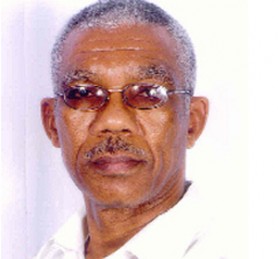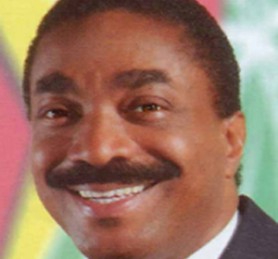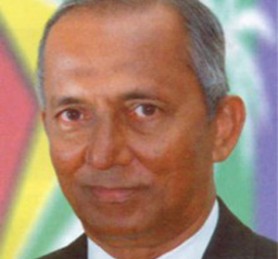The three high-profile bids for the PNCR’s presidential candidacy are being seen as an opportunity to resuscitate the party, which has been grappling with internal divisions and a loss of support.
Former party chairman Winston Murray, current Vice-Chairman Basil Williams and long standing member Brigadier (rtd) David Granger have all declared their interest in being the party’s candidate, following party leader Robert Corbin’s decision against running again. As a result, whoever emerges as the candidate would be the first person to be selected who is not the party’s leader, which has been the precedent so far.
Corbin has withstood two successive challenges to his leadership of the party but there was public fallout in both instances. In the case of the former, Vincent Alexander and supporters of his campaign subsequently left the party. They later supported Murray’s candidacy but that election also generated public acrimony. In addition to Alexander and his supporters, Murray’s bid to be party leader last year resulted in former Reform members, including co-founders Stanley Ming and Artie Ricknauth, indicating that they would be willing to return to work with the party under his stewardship.



In addition to internal divisions, the party also has to work to rebuild its constituency, after it recorded almost 50,000 less votes than it polled in 2001.
Activist and ACDA executive Eric Phillips was the former deputy leader of the PNCR’s Reform component, which was integrated into the party after most of its members left. According to him, the PNCR needs to unite and he believes that to the extent that the process to select a candidate would result in a consensus candidate it would benefit the party. He also said that with Corbin out of the running, there should be less acrimony over the acceptance of the results. “Once the process is over, it should help the party rebuild,” Phillips said, adding that at present there are three or four different groups “running around the country and saying different things”.
However, Phillips added that while process would likely help the party solve its problems, ACDA believes that it would not solve the country’s problems if the PNCR and the other parties continue to ignore the electoral system and the selection of representatives from a list. “That doesn’t help the country move forward,” he explained, emphasising that all the parties need to address the issue.
A statement issued on behalf of Murray last week emphasised the support he has received from many members of the PNCR, including senior members, members of civil society and the business community. “Mr Murray is confident that his vast experience in the public service and yeoman service to the party–more than 30 years–more than qualified him to be presidential candidate of the PNCR,” it said.
Murray’s supporters include MPs Aubrey Norton and Mervyn Williams as well as PNCR Central Executive Member Gillian Burton, Eugene Gilbert, Dr Richard Van West-Charles, Priest Mwanza, Mark Walkes, Ronald Austin and others. They accompanied him on a visit to his home town of Leguan on October 3, when he announced his bid to be candidate. However, the announcement was only publicly confirmed last week, after both Granger and Williams declared their intentions. Although he has been meeting with party supporters countrywide to canvass support, Murray has been criticised by persons within the party for not publicly making his intentions clear while relying on Dr Van West-Charles as a spokesman.
‘A dark horse’
For his part, Granger has emphasised his interest in uniting the party. “I think if the party is going to fulfil the objectives and satisfy the interests of its constituents, there must be a greater degree of unity and I think I can contribute to both national and internal party unity. And so, in that regard, this is an opportune time for me to be involved in a way that I have never been involved before,” he said after announcing his bid to be candidate.
Prior to the announcement of Granger’s candidacy, there had been support for him among the members of party groups in North America which pegged him as a “dark horse” candidate, in much the same was Barack Obama swept the US Democratic Primaries. A Corbin supporter in the US, Bernita Primo, in an e-mail that was circulated among party members and supporters, said Granger was “the man with the common touch, to be the presidential candidate for the PNCR/ coalition for the next national elections to be held in 2011.” She noted that in the light of the country’s current crime situation, the country needed a president who would “confront corruption, crime and mayhem on all fronts” and possessed “the mental fortitude; intellectual capacity, reservoir of strength, and grassroots touch to pull a nation out of distress.”
The prospect of Granger’s candidacy, however, has also triggered debate about his association with the PNC’s time in government—during which time the party was accused of rigging elections—and whether or not it is relevant to his candidacy.
GAP/ROAR MP Everall Franklin, asked about his party’s potential alliance with the PNCR and the relevance of the party’s history, said his party believes that a period dealing with issues of the past toward reconciliation is required. In this regard, he said there is need for a serious discourse, which would involve the PPP, the PNC, the UF and the WPA.
However, referring to Granger’s military record and the discussion it prompted after he announced his interest, Franklin noted that “any and every officer during that period” could be painted with the same brush and he questioned why Granger should be singled out. While he conceded that some might argue that the issue is relevant because he wants to be president, he questioned why no one objects to a sitting president who breaches the law and makes light of our Constitution. “The past is important but it is our present which affects us and our children in a very real way. So we have a long hypothetical discussion on a ‘what if’ and disregard ‘what is,’” he said.
Franklin further emphasised that GAP would work with any party, including the PPP, if certain core principles can be agreed to, which in the end will benefit the Guyanese people. “The PPP to date has not demonstrated that desire to work towards a government of national unity and is comfortable wielding power in a manner that defies logic,” he, however, said, noting that the proof of the pudding would be in the eating.
Granger is on record as conceding that there were “errors” by both the PPP and the PNC. “I think we must move away from anecdote and if there is evidence that wrong has been done these things could be investigated,” he explained.
‘Newer players ’
When current party Vice-Chairman Williams announced his bid for the candidacy, his emphasis that he could represent a break with the past was a comment on the prominent association of both Murray and Granger with the PNC government. “I believe we need to change the discourse,” Williams said, explaining that the country’s politics and politicians as “stranded in the past.” He argued that the PPP’s constant resort to go into the past to blame the PNC is a “great distraction” when current issues arise and, as a result, said “the candidate that we select must be a candidate that they can’t fix in the past.”
Williams said while it would be impossible to prevent political opponents from fabricating claims against him in a bid to vilify him, he has no fear. “One thing is for sure, they can’t fix me back in the 1950s, 60s, 70s and 80s, [and] that is the most important thing,” he said.
He said PNCR members and supporters both here and overseas had been urging him to contest for the candidacy. “They have been urging me to step up, because they believe I am a leader [and] they believe I can make a contribution,” he said, while adding that he believed he has been trained and prepared by the party for that purpose.
Another former Reform member Peter Ramsaroop said it was a good development that the PNCR has three candidates at this point. In particular, he said it was significant that the leader would not automatically be the candidate and he commended Corbin for “opening” the process. At the same time, he added that too much has been made of the fact that the candidate would not be the leader of the party and would therefore be undermined. He pointed out that in the US, the party leaders are most times not the presidential candidate.
However, Ramsaroop lamented the absence of “newer players” on the scene as well as an absence of specifics from either of the three. He said he needed to hear why any of them would make a better leader and what they would do to move the country forward. He described Granger as “a very good possibility,” adding that he could be a statesman-like candidate. He said while he respected Murray, he believed that the time for his candidacy had passed. As regards Williams, he noted that while he is the newest of the bunch, he still needed to hear what he would do.





